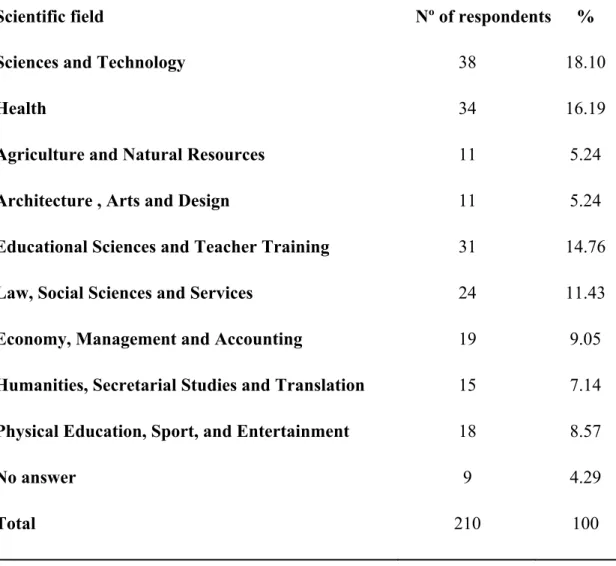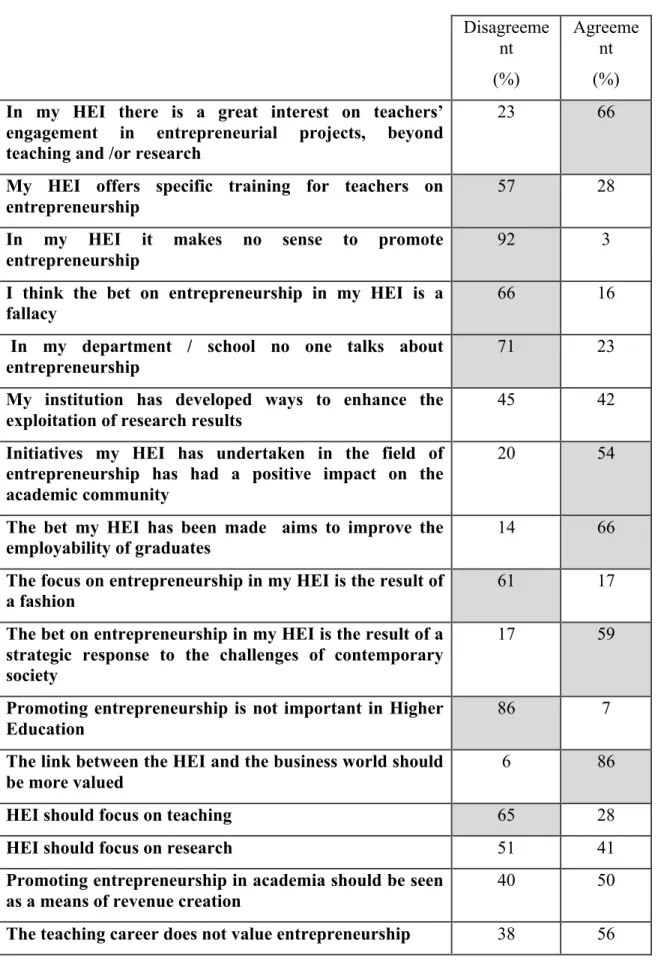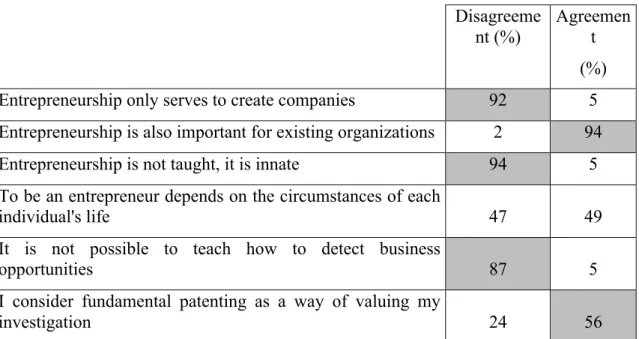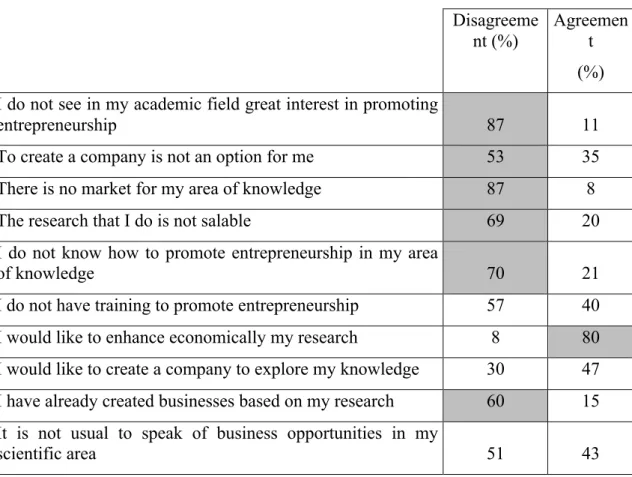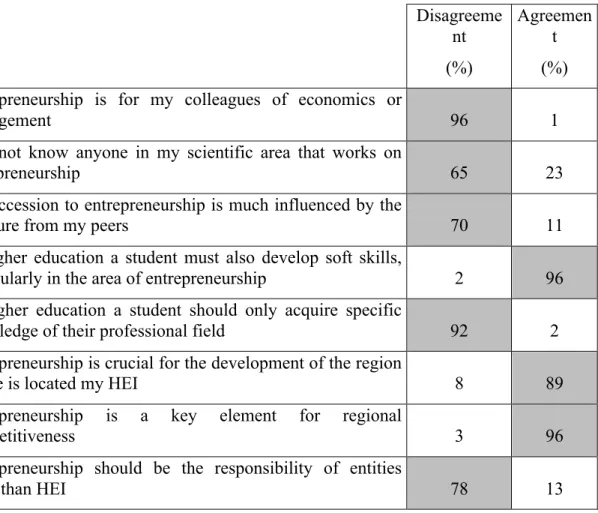POLYTECHNIC TEACHERS’ PERSPECTIVES ABOUT
ENTREPRENEURSHIP: A PORTUGUESE CASE STUDY
Nuno Caseiro, ncaseiro@ipcb.pt
Escola Superior Agrária do Instituto Politécnico de Castelo Branco, Portugal Domingos Santos, domingos.santos@ipcb.pt
Escola Superior de Educação do Instituto Politécnico de Castelo Branco, Portugal Centro de Investigação em Ciências Sociais da Universidade do Minho, Portugal
Cristina Pereira, cristina.pereira@ipcb.pt
Escola Superior de Educação do Instituto Politécnico de Castelo Branco, Portugal Instituto de Psicologia Cognitiva, Desenvolvimento Vocacional e Social da
Universidade de Coimbra, Portugal Margarida Afonso, margarida.afonso@ipcb.pt
Escola Superior de Educação do Instituto Politécnico de Castelo Branco, Portugal Centro de Investigação em Educação da Universidade de Lisboa, Portugal Abstract
Higher education institutions are more and more engaged in strategies to promote entrepreneurship among their students and teachers. They have been implementing different instruments to attain that aim: from business incubation centers to start-ups support, from academic entrepreneurship contests to coaching methodologies.
The studies about this field of activity are mainly concerned with the role students can undertake to initiate business projects based on innovation.
Less attention, on the contrary, has been put on the teachers’ side, their perceptions about entrepreneurship, and the way higher education institutions are addressing this important group - what remains unknown is how higher education institutions are preparing teachers for these entrepreneurship opportunities.
This paper is dedicated to the analysis of the perspectives regarding entrepreneurship of Portuguese polytechnic teachers on the context of their institutions, the types of entrepreneurial profile teachers possess and the skills they think they should acquire to empower them for supporting entrepreneurship education.
The empirical data results from a questionnaire “Perspetivas sobre o empreendedorismo dos docentes do Ensino Superior Politécnico" (“Polytechnic teachers’ perspectives about entrepreneurship”) are presented, analysed and discussed in the context of the Portuguese reality.
Keywords
Entrepreneurship, education, teachers’ perceptions, higher education institutions, polytechnic institutions, Portugal
1. Introduction
The contemporary knowledge society and economy require to renew the founding pillars of higher education institutions (HEI) and redefining their missions. From being entities almost exclusively focused on training and research functions, HEI face nowadays, new challenges, such as entrepreneurship.
The traditional research approach that has been followed in this area focuses, on the one hand, on the institutional role as a whole (the concept of entrepreneurial university) and, on the other hand, on output indicators and on the students’ profile and attitudes towards entrepreneurship.
Less attention has been devoted to the contribution of teachers. In this paper we try to contribute to fill this gap by accomplishing a study about the teachers’ perspectives regarding entrepreneurship in public polytechnic higher education reality in Portugal.
2. The concept of entrepreneurial university
Fostering the entrepreneurial potential of a university or a polytechnic1 is a major challenge which requires an approach that identifies knowledge as an asset which can be created, developed and transmitted. The development of an entrepreneurial HEI can be achieved in three ways that are not alternatives but rather complementary and interlocking.
First, promoting entrepreneurship in HEI involves creating a sense and a culture of risk, search and discovery. The promotion of this institutional cultural change necessarily involves, for example, innovation in teaching and learning. HEI can thus create a virtuous circle in which the requirement of teachers may be oriented towards more creative, innovative and appealing environments and teaching and learning processes (Lazzeretti et al, 2005).
It is also essential that an entrepreneurial culture may be stimulated by way of training programs on detection of market opportunities, implementing business solutions or the promotion of new start-ups. Entrepreneurship education is now so necessary to a student from management or economics, as for a student of humanities, social sciences, engineering or arts. The awareness, the creation of training packages, modules and courses should be clearly oriented to provide frameworks and tools that facilitate the creation of conditions for self-employment and intrapreneurship (Hannon, 2008).
Finally, a third dimension requires HEI, as organizations, are entrepreneurial, not only in their training programs, but also in the way they operate. HEI should, for example, be able to commercialize some of their assets, which are based on the production of codified, scientific and technological knowledge. Without jeopardizing its primary mission, HEI need to rethink their offer and their markets (Sayyed et alii, 2009).
!!!!!!!!!!!!!!!!!!!!!!!!!!!!!!!!!!!!!!!!!!!!!!!!!!!!!!!!!!!!!
1 In Portugal both universities and polytechnics are part of the higher education system, we will came to this later on the methodological section.
These three converging paths to develop an HEI are, all of them, very important. Etzkowitz (1983) adopted the designation of entrepreneurial university to precisely describe the many changes that reflect a more active role of HEI in the direct and indirect promotion of knowledge transfer and scientific and technological know-how that is associated with academic research. The growing social pressure on universities to extend their traditional missions and adopt a more pro-active participation in the economic development of their region led them to the definition of a third mission - the entrepreneurial university, a concept that we took in the present article, equivalent to the one of entrepreneurial HEI, being it a university or a polytechnic institution.
There is currently an abundant specialized literature about the notion of entrepreneurial university (Etzkowitz, 2004; Guerrero-Cano, 2008; Pilbeam, 2008; Lehrera et al, 2009). The defy being that HEI, in the context of a thorough redesign of the pillars that have founded the society and the knowledge economy, may give a complete answer and be up to the challenges that are permanently raised. It is, in fact, also a matter of survival: the need for adaptation to the rapidly changing world cannot stay apart of their missions, as sometimes they were rightly accused - the ivory tower syndrome (Etzkowitz et al, 2000; Günther et al, 2007).
In general, the critical dimensions that are assigned to entrepreneurial HEI are (Clark, 2004; Hannon, 2008):
- The market valuation of knowledge;
- The creation of mechanisms for interface and networking with potential users, particularly with the business fabric and their surrounding local and regional institutions;
- The existence of an institutional strategy with a well defined mission and objectives;
- The promotion of an organizational culture that foments decisional autonomy and risk-taking;
- The creation of internal mechanisms for monitoring and evaluation in order to provide inputs for a constant trajectory readjustment.
The mobilization of HEI to respond properly to these new challenges requires a holistic or systemic approach, not merely focused on marketable interventions, such as the provision of value added services or the provision of business oriented research. Some authors (Clergeau et al, 2005; Gjerding et alii, 2006; Gibb et al, 2009; Santos and Caseiro, 2012), suggest a shift from a transactional logic to another approach that may be transformational, with a more organizational and inclusive emphasis aiming at mobilizing the educational community and, also, that can be based more on medium and long term projects than in isolate or casuistic initiatives.
Therefore, it is absolutely vital, in building an entrepreneurial HEI, to adopt changes in the institutional organizational culture - that is, it seems, a critical step that has to be overcome. More than the commoditization and commercialization of knowledge,
assuming a "bottom-up", aggregative and inclusive approach that can be a factor for mobilizing teachers and students of the different academic organs. It is, to say it synthetically, to internalize entrepreneurship as part of the genetic code of the HEI, as something that is intrinsic to its mission.
The construction of an HEI with an entrepreneurial profile clearly seems to substantiate an organizational and incremental innovation process - the relentless pursuit of an entrepreneurial culture that is adjusted continuously to the societal and economic challenges, ensuring the passage of a non-schumpeterian neo-classical paradigm to a schumpeterian model of entrepreneurship, whose first strategic aim lies on the innovation production, in its multiple modalities (Drucker, 1993; Potter, 2008).
If HEI do not become agents of innovation, ie entrepreneurial institutions, they certainly will become more part of the problem (the status quo) than part of the the solution in terms of regional development and national and international competitiveness. The big question and challenge for HEI is to ensure a systematic adaptation to the dynamics of change that are continuously going on, promoting innovative responses that enable institutions and firms, as well as territories, to increase their competiveness and sustainability levels, avoiding the so-called institutional sclerosis.
It is in this context of entrepreneurial HEI that is worth to analyze the role that teachers have been holding this process. In general, studies on this subject, as we will stress further on, focus on other dimensions and variables, concentrating either on a logic of inputs control (allocated resources to the entrepreneurial activity - financial funds, for example) either on a logic of production of outputs (number of spin-offs, ...). Less attention has been paid to the role and dynamics performed by university or polytechnic teachers in this field - say they have been seen as taken for granted (Fayolle, 2013). There seems to be a clear assumption, too optimistic but also too narrow, that their profile, their representations, their contribution in promoting academic entrepreneurship naturally favors those dynamics.
2. The challenges of entrepreneurship education
Education and training for entrepreneurship development are integrated into the strategy of the European Commission, under the Best Procedure and the "Key Competences for Lifelong Learning" (EC, 2006), and are now widely recognized as determining factors for economic and cultural development across Europe.
Entrepreneurship education is considered a key area of structural intervention (Council report, "Education" for the European Council, 2001). There is now a solid research attesting its importance and there is, likewise, quite a lot of publications, a wide range of reports of good practices, recommendations, policies and European action plans. Recommendations were divulged for their promotion through education and learning, and also the involvement of various entities, such as public authorities in the fields of education, employment, industry and business (EC, 2006, 2008 ).
The contexts of training/education are privileged means to promote the development of entrepreneurial skills. On one hand, they are guided by professionals; secondly, because
the introduction of experiential teaching methods (learning by doing), they can be complementary to more traditional teaching processes, providing an interesting source of curriculum enrichment (Pereira et alii, 2013).
In recent years, many countries have developed models and experiments aiming at the implementation of programs promoting entrepreneurship. In parallel, higher education policies are progressively responding, by designing and implementing academic centers of entrepreneurship and also by encouraging their students, researchers and teachers to transform their results in patents, spin-offs or technology and businesses licenses (Wood, 2009).
Entrepreneurship education can help foster a more entrepreneurial and innovative culture in Europe, changing mindsets and providing the necessary skills (EU, 2012b). And higher education should be associated with entrepreneurship by preparing students for a world of constant change, the deepening of knowledge, skills and attitudes, all factors that are essential to the design and implementation of projects. This preparation can be achieved through the development of planning abilities to create real projects and, therefore, keeping the skills and knowledge associated with the identification and evaluation of contexts and opportunities.
We argue that entrepreneurship education should assume a transversal dimension in HEI and include a set of curricular and extracurricular programs that foster the creation of an environment that organizes itself as an entrepreneurial ecosystem (Carvalho et alii, 2010), which can help promoting the development and adaptation of skills, knowledge dissemination and technology, thus creating “niches" of local development, according to a logic of synergies and interdependencies promotion (Costa and Carvalho, 2011).
The European Commission (2006) pays particular attention to entrepreneurship in higher education considering that HEI should integrate this topic in various components of their programs of study and require or encourage participation in more specific entrepreneurship courses. This position relates to the fact that entrepreneurship education traditionally focus on economics and management courses, or be an optional field, functioning as an autonomous curricular unit.
2.1. The teachers’ role
Teachers, key stones in any educational system, have been considered essential entities in this paradigm shift and determining agents in the construction of new knowledge and skills, being responsible for the task of preparing the new generations to an era that requires new frameworks and a renewed citizenship. The perception they have about these issues, how they act in their professional space and how organizations support them in their entrepreneurial efforts are also critical in this paradigm shift (EC., 2008, 2012a).
However, various aspects of the identified problems have not yet been, in our view, properly studied - but it is critical to address them correctly so that a new range of
intervention strategies may be designed and implemented to improve the role of higher education institutions and their teachers in the field of entrepreneurship.
Teachers play a crucial role in guiding students, on fostering students’ projects, on testing new approaches and methodologies, on the involvement in knowledge transfer and on the exploitation of the knowledge generated by their research activities. Basically, it is through their practice and example that an entrepreneurial culture is created and transmitted; at first, this is reflected internally in the HEI reality and, if sufficiently strengthened, will then generate spill-over’s towards the corporate and institutional fabric of the region.
Studies on the role of HEI in entrepreneurship training, as mentioned above, have neglected this analytical perspective that seems absolutely critical either to the concept of the entrepreneurial HEI, either in the light of the state-of-the-art about the challenges entrepreneurship education is facing.
3. Methodology
The higher education system in Portugal is structured in a binary system, including both universities and polytechnics. The main differences concern, basically, the nature of the training curriculum profile (more professionally oriented on the polytechnics) and the type of research that predominates (fundamental research being privileged on universities).
Data collection for this study was based on a questionnaire (online survey), which was directed to all public polytechnic institutions of Portugal (15), encompassing a 9965 teacher’s universe, according to the Directorate General of Higher Education for 2013. There were 210 responses, a number that represents 2.1% of the Portuguese Polytechnic teachers – although relatively low, this figure allows for a confidence level of 99% and a confidence interval of 8.8%.
A 41 item questionnaire was developed, featuring a 4-point Likert scale for responses. This scale was largely concerned with the perspectives Portuguese polytechnic teachers possess about the role that their institutions assume in the promotion of entrepreneurship, the conceptual notion they have about entrepreneurship, the self-awareness regarding entrepreneurship and, finally, other stakeholders’ role on the entrepreneurial process.
This questionnaire was applied through a period of 1 month, on the first trimester of 2014, after a first direct contact with the institutional responsible bodies of all polytechnic institutions, asking for the dissemination of the survey in their academia. The gender distribution of the respondents is 52% women and 46% men. The respondents were dispersed among different training areas (table 1), the highest figure (18,1%) on the field of Sciences and Technology (S&T).
Table 1- Respondents’ training areas
Scientific field Nº of respondents %
Sciences and Technology 38 18.10
Health 34 16.19
Agriculture and Natural Resources 11 5.24
Architecture , Arts and Design 11 5.24
Educational Sciences and Teacher Training 31 14.76
Law, Social Sciences and Services 24 11.43
Economy, Management and Accounting 19 9.05
Humanities, Secretarial Studies and Translation 15 7.14
Physical Education, Sport, and Entertainment 18 8.57
No answer 9 4.29
Total 210 100
3.1. Data analysis
3.1.1. Polytechnic Institutional role on the promotion of entrepreneurship
The data in Table 2 allow, first, to realize that the function of promoting entrepreneurship in the Polytechnics is considered very important, making clear the broader role they may have on this subject, not focused exclusively on the functions that were traditionally entrusted to HEI, of teaching and research.
Table 2 - Dimensions regarding the role of HEI in the promotion of entrepreneurship Disagreeme nt (%) Agreeme nt (%)
In my HEI there is a great interest on teachers’ engagement in entrepreneurial projects, beyond teaching and /or research
23 66
My HEI offers specific training for teachers on entrepreneurship
57 28
In my HEI it makes no sense to promote entrepreneurship
92 3
I think the bet on entrepreneurship in my HEI is a
fallacy 66 16
In my department / school no one talks about entrepreneurship
71 23
My institution has developed ways to enhance the
exploitation of research results 45 42
Initiatives my HEI has undertaken in the field of entrepreneurship has had a positive impact on the academic community
20 54
The bet my HEI has been made aims to improve the employability of graduates
14 66
The focus on entrepreneurship in my HEI is the result of
a fashion 61 17
The bet on entrepreneurship in my HEI is the result of a strategic response to the challenges of contemporary society
17 59
Promoting entrepreneurship is not important in Higher Education
86 7
The link between the HEI and the business world should be more valued
6 86
HEI should focus on teaching 65 28
HEI should focus on research 51 41
Promoting entrepreneurship in academia should be seen as a means of revenue creation
40 50
It is largely recognized by the respondents (92%), the interest in deepening the trajectory conducive to an entrepreneurial institutional culture. Most respondents teachers acknowledge that, in their own HEI, the bet in this area has a strategic character and really constitutes a serious institutional commitment, which has had a positive impact on the academia, aiming in particular to improve the employability of graduates and the future generation of revenues for HEI. The need to develop other cross-cutting skills, not only related to their area of academic training, is also acknowledged.
Moreover, the respondents claim that HEI should deepen the connection with the business world, although, paradoxically they express doubts about the institutional involvement in exploiting the potential of R&D. It is patent the need to tune the internal mechanisms of communication on this field and of enhancement of knowledge creation and diffusion.
Teachers express the opinion that there is still a clear deficit of training in the field of entrepreneurship promotion, sensu lato, and also that the career investment on the area of entrepreneurship is not properly recognized by the academia.
3.1.2. Entrepreneurship conceptual dimensions
It seems to prevail, among the respondents, a heterodox view of the concept of entrepreneurship, not just restricted to the business context - which reinforces its role as an instrument for promoting employability. Furthermore teachers have the strong conviction that entrepreneurial competences are not innate, which allows to clearly see training as a strategic bet to develop on the HEI.
Table 3 - Dimensions regarding entrepreneurship dimensions Disagreeme
nt (%)
Agreemen t (%) Entrepreneurship only serves to create companies 92 5 Entrepreneurship is also important for existing organizations 2 94 Entrepreneurship is not taught, it is innate 94 5 To be an entrepreneur depends on the circumstances of each
individual's life 47 49
It is not possible to teach how to detect business
opportunities 87 5
I consider fundamental patenting as a way of valuing my
3.1.3. Teachers self-awareness regarding entrepreneurship
Most respondents stated that the respective area of academic interest and expertise has potential to be exploited by means of an entrepreneurial activity; most teachers also do not exclude the possibility of eventually launching a business project, and they even underline the existence of market opportunities in their scientific and professional areas - their R&D activity is, according to their perspectives, salable. Only a minority of teachers reported having previous experience in setting up businesses.
Table 4 - Teachers self-awareness regarding entrepreneurship Disagreeme
nt (%)
Agreemen t (%) I do not see in my academic field great interest in promoting
entrepreneurship 87 11
To create a company is not an option for me 53 35 There is no market for my area of knowledge 87 8
The research that I do is not salable 69 20
I do not know how to promote entrepreneurship in my area
of knowledge 70 21
I do not have training to promote entrepreneurship 57 40 I would like to enhance economically my research 8 80 I would like to create a company to explore my knowledge 30 47 I have already created businesses based on my research 60 15 It is not usual to speak of business opportunities in my
scientific area 51 43
3.1.4 Other stakeholders’ role
It is recognized that entrepreneurship goes beyond a more narrow approach, focusing, as traditionally was assumed, exclusively in the areas of economic and business sciences. Apparently, adherence to entrepreneurship is primarily the resultant of personal endogenous motivations, than resulting from external stimuli, including peers’ influence. It is, moreover, clearly emphasized the importance of entrepreneurship has on competitiveness and regional development, including the role of HEI in the intermediation of training and S&T knowledge with the surrounding community.
Table 5 - Dimensions regarding other stakeholders role Disagreeme nt (%) Agreemen t (%) Entrepreneurship is for my colleagues of economics or
management 96 1
I do not know anyone in my scientific area that works on
entrepreneurship 65 23
My accession to entrepreneurship is much influenced by the
pressure from my peers 70 11
In higher education a student must also develop soft skills,
particularly in the area of entrepreneurship 2 96 In higher education a student should only acquire specific
knowledge of their professional field 92 2
Entrepreneurship is crucial for the development of the region
where is located my HEI 8 89
Entrepreneurship is a key element for regional
competitiveness 3 96
Entrepreneurship should be the responsibility of entities
other than HEI 78 13
3.1.5. Key resources to the success on the promotion of an entrepreneurial academic strategy
On the study respondents were also asked to rank the top three resources they deem as priority to the success on the promotion of entrepreneurship in their institutions. The most referred resources were, as follows:
1. Incubation of initiatives/business projects; 2. Teacher training;
3. Involvement of students in the projects; 4. Insertion in national/international networks; 5. Partnerships with external entities.
The top priority for respondent teachers refers to the need of HEI give more answers in the field of business incubation initiatives, through mechanisms of validating ideas and projects and the minimization of risk taking. Following what was previously expressed,
of the polytechnic institutions for the successful promotion of entrepreneurship, strengthening the position already expressed beforehand.
The collected data suggest, it appears, that there is a vision on the part of teachers based on the prevalence of a very institutionally endogenous model of organization in promoting entrepreneurship. This vision favors internal resources to the detriment of a different approach that may include closer collaboration with the actors of the surrounding territory (local/ regional), particularly with companies and entrepreneurs, although, paradoxically, it has been strongly mentioned the need to establish such cooperation.
It was found, similarly, that to the following dimensions it was not attributed great importance as a success factor for promoting entrepreneurship strategies on the polytechnic institutions (in descending order of importance):
1. Funding;
2. Involvement of business in supporting promoters; 3. Participation of companies in the process;
4. Information on support/subsidies; 5. Material resources;
Assessment in terms of teachers’ performance evaluation.
Interestingly, and contrary to what seemed to be expected by the opinions issued before, teacher assessment, closely associated with the teaching profession, does not seem to constitute a priority intervention factor. Questions concerning in particular financial and material resources are also not seen as critical variables.
4. Final remarks
This study was directed at examining the polytechnic Portuguese teachers’ role in promoting entrepreneurship.
The literature on this subject is still, surprisingly, scarce, not much is actually known about these important stakeholders in the dynamics of academic entrepreneurship. The analysis of the collected data highlights the following aspects:
- Teachers recognize and value the importance of institutional investment in promoting entrepreneurship; moreover, teachers positively emphasize the efforts that their polytechnics are already accomplishing;
- It is also clearly expressed the proactive role that teachers want to assume in this context;
- It is underlined the relevance that polytechnic HEI, through this new institutional strategic mission they embrace - the promotion of
entrepreneurship -, can have on regional development, aligning the teachers’ contribution in the success of their institutions, while entrepreneurial entities. It was expressed the need to strengthen the mechanisms of specific training for entrepreneurship education - which support the theoretical analysis on the subject, according to which entrepreneurship education must be under the responsibility of properly trained professionals -, and also the need to provide logistical reinforce the support to incubating academic entrepreneurial projects.
Despite the exploratory nature of this work, some clues that can support the definition of intervention strategies and future research projects seem to have been raised.
5. References
Carvalho, L.M.C., M.T.G. Costa, P.M. Dominguinhos (2010), "Creating an entrepreneurship ecosystem in higher education", in S. Soomro (eds.), New Achievements in Tecnology, Education and Development, Austria: I-TECH Education and Publishing, 1-10.
Clark, B. (2004), Sustaining Change in Universities: Continuities in Case Studies and Concepts, Maidenhead: Open University Press.
Clergeau, Cécile and Schieb Bienfait, Nathalie (2005), “Université et entrepreneurial – comment créer une cellule resources dédiée à l’entrepreneuriat?”, Gérer et Comprendre, 79, 16-31.
Costa, M. T., L.M.C. Carvalho (2011), "A educação para o empreendedorismo como facilitador da inclusão social: um caso no ensino superior", Revista Lusófona de Educação, 19, 103-118.
Drucker, Peter (1993), Innovation and Entrepreneurship, New York: Harper Business. Etzkowitz, Henry (1983), “Entrepreneurial scientists and entrepreneurial universities in
American academic science”, Minerva, 21, pp.198-233.
Etzkowitz, Henry (2004), “The evolution of the entrepreneurial university”, International Journal of Technology and Globalisation,1.1, pp.64-77.
Etzkowitz, Henry, Webster, Andrew, Gebhardt, Christine e Terra, Branca (2000), “The future of the university and the university of the future: evolution of ivory tower to entrepreneurial paradigm”, Research Policy, 29, pp. 313-330.
European Commission (2006), Implementing the community Lisbon Programme: Fostering entrepreneurial mindsets through education and learning. Brussels: European Union.
European Commission (2008), Entrepreneurship in higher education, especially within non-business studies. Brussels: European Union.
European Commission (2012a), Building Entrepreneurial mindsets and skills in the EU. Brussels: European Union.
European Commission (2012b), Effects and impact of entrepreneurship programmes in higher education. Brussels: European Union.
Fayolle, Alain (2013), “Personal views on the future of entrepreneurship education”, Entrepreneurship and Regional Development, 25.7-8, 692-701.
Gibb, Allan, Haskins, Gay e Robertson, Ian (2009), Leading the Entrepreneurial University. Meeting the Entrepreneurial Development Needs of Higher Education Institutions, Oxford: University_of_Oxford.
Gjerding, Allan, Wilderom, Cleste, Cameron, Shona e Scheunert, Klaus_Joachim (2006), “L’université entrepreneuriale: vingt pratiques distintives, Politiques et Gestion de l'Enseignement Supérieur, 3.18, pp. 95-124.
Guerrero Cano, M. (2008), The Creation and Development of Entrepreneurial Universities in Spain. An Institutional Approach. Barcelona: Universitat Automona.
Günther, Jutta e Wagner, Kerstin (2007), Getting out of the Ivory Tower – New Perspectives on the Entrepreneurial University, Chur: Swiss Institute for Entrepreneurship.
Hannon, Paul (2008), Entrepreneurship Education Strategies and Best Practice: Views, Toughts, Challenges, Opportunities. Http://ec.europa.eu/education/higher education/doc/business/hannon_en.pdf.
Lazzeretti, L. and Tavoletti, E. (2005), “Higher education excellence and local economic development: the case of the entrepreneurial University of Twente”, European Planning Studies,13.3, pp.475-493.
Lehrera, M., Nell, P. and Gärber, L. (2009), “A national systems view of university entrepreneurialism:inferences from comparison of the German and US experience”, Research Policy, 38, pp. 268–280.
Pereira, Cristina, Afonso, Margarida and Santos, Domingos (2013), “Educating for entrepreneurship: a new challenge for teacher training institutions”, Egitania Sciencia, Special Edition (ENTENP), pp. 11-28.
Pilbeam, C. (2008), “Designing an entrepreneurial university in an institutional setting”, Higher Education Policy, 21, pp. 393–404.
Potter, J. (ed.) (2008), Entrepreneurship and Higher Education, Paris: OECD.
Santos, Domingos and Caseiro, Nuno (2012), “Empreendedorismo em instituições de ensino superior: um estudo de caso”, in Atas do 14º Workshop APDR – Empreendedorismo e Desenvolvimento Regional, Setúbal: IPS/APDR, pp. 98-106. Sayyed, Amiri, Kavousy, Esmaeil and Husseini, Ali (2009), “Strategies for creating entrepreneurial universities”, European Journal of Social Sciences, 11.3, pp. 496-506.
Wood, Matthew (2009), “Does One Size Fit All? The Multiple Organizational Forms Leading to Successful Academic Entrepreneurship”, Entrepreneurship Theory and Practice, 33.4, pp. 929-947.
